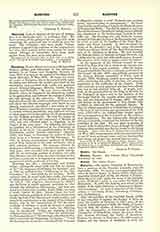

Haneberg, DANIEL BONIFACIUS VON, a distinguished German prelate and Orientalist of the nineteenth century, b. at Tanne near Kempten, Bavaria, June 16, 1816; d. at Speyer, the capital of the Rhine Palatinate (Bavaria), May 31, 1876. He began his classical course at Kempten, where he pursued with superior ability and industry the studies prescribed by the curriculum, and mastered with hardly any guidance several Oriental languages (Hebrew, Arabic, Syriac, Persian, and Ethiopic). He next betook himself to Munich, where he completed his elementary studies in the gymnasium, and followed the courses of philosophy and theology in the university. While a theological student, he cultivated Sanskrit and Chinese over and above the Oriental languages with which he was already acquainted, translated a few works of Cardinal Wiseman, contributed several essays and poems to various German periodicals, and neglected nothing of what appertains to the spiritual life in one preparing for the Catholic priesthood. He took his degree of Doctor of Theology at the University of Munich in 1839, and was ordained priest at Augsburg, on August 29 of the same year. The following November he qualified for a Privatdozent in the University of Munich by his thesis “De significationibus in Veteri Testamento praeter literam valentibus” (Munich, 1839), and began in December his career of thirty-three years as a lecturer on the Old Testament. In 1841, he became extraordinary professor of Hebrew and of Holy Scripture in the same university, and in 1844 ordinary professor. His lectures, wherein he displayed a solid learning, a constant discretion, and a deep piety, were attended with great profit and delight by an increasing number of students not only from Bavaria, but also from the other German States, and soon caused him to be regarded as one of the most prominent Catholic professors of his day.
Haneberg was also a distinguished and prolific writer. During the years 1840 and 1841 he worked on his “Die religiosen Alterthumer der Hebraer”, and in 1844 he published his “Einleitung in das Alte Testament” as a text-book for his lectures. In the course of time, he recast both these works, the former of which passed to the second edition in 1869 under the title of “Die religiosen Alterthumer der Bibel”, and the latter of which appeared rewritten as “Geschichte der biblischen Offenbarung,” and was rendered into French by Goschler (Paris, 1856), reaching a fourth edition in 1876. Besides these, his best-known works, he published several others which were chiefly the fruit of his Hebrew and Arabic studies, and formed his contribution to the Journal of the Oriental Society and to the transactions of the Bavarian Academy of Sciences of which he became a member in 1848. Among these latter works the following may be mentioned: “Ueber die arabische Psalmenubersetzung des Saadia;” “Ueber das Schulwesen der Mohammedaner;” “Erorterungen uiber Bendo-Wakidi’s Geschichte der Eroberung von Syrien;” “Ueber die Theologie des Aristotles;” and chiefly his “Canones S. Hippolyti arabice e codd. Romanis cum versione Latina annotationibus, et prolegomenis.” He found time also for contributing articles to the Kirchenlexicon of Wetzer and Welte. Nor did he neglect in any way the various duties of his priestly calling, such as preaching, attendance at the confessional, answers to sick-calls, etc. His learning, and still more his virtues, secured for him great favor at the Bavarian court, and he acted as tutor in the families of the Duke Maximilian and Prince Leopold. In 1850, he joined the Order of St. Benedict, and a few years afterwards (1854) was chosen abbot of the Benedictine monastery of St. Boniface at Munich. He soon founded the Reform School at Andechs in Upper Bavaria, and a little later he tried, but with small success, to establish missions of his order in Algiers and in the Orient.
At the approach of the Vatican Council he was invited by Pope Pius IX to share in the labors preparatory to that august assembly. After the dogma of papal infallibility had been solemnly proclaimed by the Council (July 18, 1870), and publicly accepted by the German Bishops assembled at Fulda (end of August, 1870), Haneberg humbly gave up his former views concerning this point of doctrine, and sincerely submitted to the authority of the Church. From 1864 onwards, several episcopal sees had been offered him, but he had declined them all. At length, however, on his presentation by the King of Bavaria for the Bishopric of Spires and at the instance of the Sovereign Pontiff, the humble abbot accepted that see, and was consecrated August 25, 1872. His zeal and success in the government of this diocese fully justified his selection for the episcopal dignity. In days of violent opposition to Catholicism in Germany—the days of the framing and application of the Falk Laws (1872-1875)—he unflinchingly fought against the encroachments of the civil power on the ecclesiastical jurisdiction. He also strenuously, though not always successfully, combated the influence of the Old Catholics of the time. He was most unsparing of himself in his confirmation tours, although the bodily fatigues thus entailed were far too much for his failing strength. After a few days of sickness he succumbed (May 31, 1876) to pneumonia, which he had contracted in one of those episcopal tours, and was lamented by both clergy and people who revered him as a saint.
FRANCIS E. GIGOT

